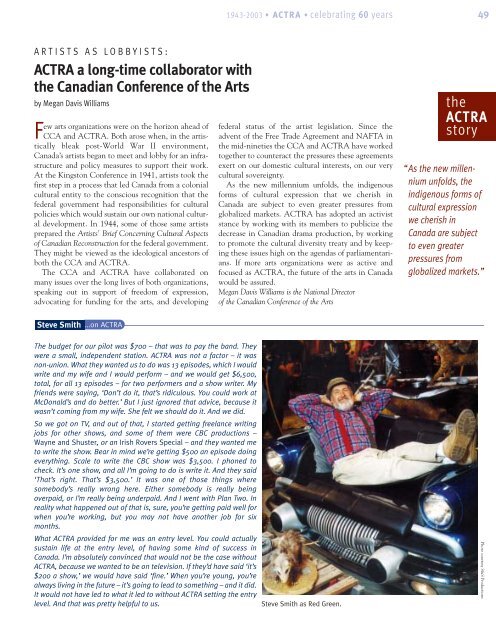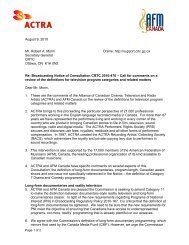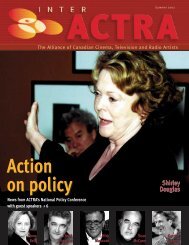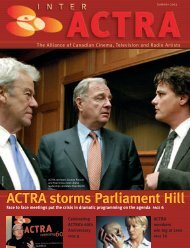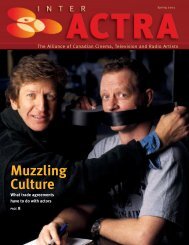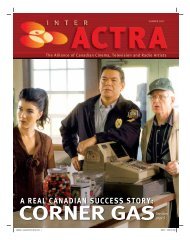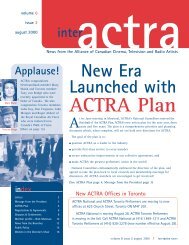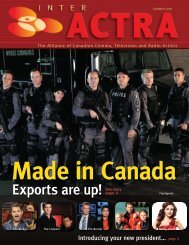Celebrating 60 years: THE ACTRA STORY This special issue of ...
Celebrating 60 years: THE ACTRA STORY This special issue of ...
Celebrating 60 years: THE ACTRA STORY This special issue of ...
You also want an ePaper? Increase the reach of your titles
YUMPU automatically turns print PDFs into web optimized ePapers that Google loves.
ARTISTS AS LOBBYISTS:<br />
<strong>ACTRA</strong> a long-time collaborator with<br />
the Canadian Conference <strong>of</strong> the Arts<br />
by Megan Davis Williams<br />
Few arts organizations were on the horizon ahead <strong>of</strong><br />
CCA and <strong>ACTRA</strong>. Both arose when, in the artistically<br />
bleak post-World War II environment,<br />
Canada’s artists began to meet and lobby for an infrastructure<br />
and policy measures to support their work.<br />
At the Kingston Conference in 1941, artists took the<br />
first step in a process that led Canada from a colonial<br />
cultural entity to the conscious recognition that the<br />
federal government had responsibilities for cultural<br />
policies which would sustain our own national cultural<br />
development. In 1944, some <strong>of</strong> those same artists<br />
prepared the Artists’ Brief Concerning Cultural Aspects<br />
<strong>of</strong> Canadian Reconstruction for the federal government.<br />
They might be viewed as the ideological ancestors <strong>of</strong><br />
both the CCA and <strong>ACTRA</strong>.<br />
The CCA and <strong>ACTRA</strong> have collaborated on<br />
many <strong>issue</strong>s over the long lives <strong>of</strong> both organizations,<br />
speaking out in support <strong>of</strong> freedom <strong>of</strong> expression,<br />
advocating for funding for the arts, and developing<br />
Steve Smith ...on <strong>ACTRA</strong><br />
The budget for our pilot was $700 – that was to pay the band. They<br />
were a small, independent station. <strong>ACTRA</strong> was not a factor – it was<br />
non-union. What they wanted us to do was 13 episodes, which I would<br />
write and my wife and I would perform – and we would get $6,500,<br />
total, for all 13 episodes – for two performers and a show writer. My<br />
friends were saying, ‘Don’t do it, that’s ridiculous. You could work at<br />
McDonald’s and do better.’ But I just ignored that advice, because it<br />
wasn’t coming from my wife. She felt we should do it. And we did.<br />
So we got on TV, and out <strong>of</strong> that, I started getting freelance writing<br />
jobs for other shows, and some <strong>of</strong> them were CBC productions –<br />
Wayne and Shuster, or an Irish Rovers Special – and they wanted me<br />
to write the show. Bear in mind we’re getting $500 an episode doing<br />
everything. Scale to write the CBC show was $3,500. I phoned to<br />
check. It’s one show, and all I’m going to do is write it. And they said<br />
‘That’s right. That’s $3,500.’ It was one <strong>of</strong> those things where<br />
somebody’s really wrong here. Either somebody is really being<br />
overpaid, or I’m really being underpaid. And I went with Plan Two. In<br />
reality what happened out <strong>of</strong> that is, sure, you’re getting paid well for<br />
when you’re working, but you may not have another job for six<br />
months.<br />
What <strong>ACTRA</strong> provided for me was an entry level. You could actually<br />
sustain life at the entry level, <strong>of</strong> having some kind <strong>of</strong> success in<br />
Canada. I’m absolutely convinced that would not be the case without<br />
<strong>ACTRA</strong>, because we wanted to be on television. If they’d have said ‘it’s<br />
$200 a show,’ we would have said ‘fine.’ When you’re young, you’re<br />
always living in the future – it’s going to lead to something – and it did.<br />
It would not have led to what it led to without <strong>ACTRA</strong> setting the entry<br />
level. And that was pretty helpful to us.<br />
1943-2003 • actra • celebrating <strong>60</strong> <strong>years</strong> 49<br />
federal status <strong>of</strong> the artist legislation. Since the<br />
advent <strong>of</strong> the Free Trade Agreement and NAFTA in<br />
the mid-nineties the CCA and <strong>ACTRA</strong> have worked<br />
together to counteract the pressures these agreements<br />
exert on our domestic cultural interests, on our very<br />
cultural sovereignty.<br />
As the new millennium unfolds, the indigenous<br />
forms <strong>of</strong> cultural expression that we cherish in<br />
Canada are subject to even greater pressures from<br />
globalized markets. <strong>ACTRA</strong> has adopted an activist<br />
stance by working with its members to publicize the<br />
decrease in Canadian drama production, by working<br />
to promote the cultural diversity treaty and by keeping<br />
these <strong>issue</strong>s high on the agendas <strong>of</strong> parliamentarians.<br />
If more arts organizations were as active and<br />
focused as <strong>ACTRA</strong>, the future <strong>of</strong> the arts in Canada<br />
would be assured.<br />
Megan Davis Williams is the National Director<br />
<strong>of</strong> the Canadian Conference <strong>of</strong> the Arts<br />
Steve Smith as Red Green.<br />
the<br />
<strong>ACTRA</strong><br />
story<br />
“As the new millennium<br />
unfolds, the<br />
indigenous forms <strong>of</strong><br />
cultural expression<br />
we cherish in<br />
Canada are subject<br />
to even greater<br />
pressures from<br />
globalized markets.”<br />
Photo courtesy S&S Productions


